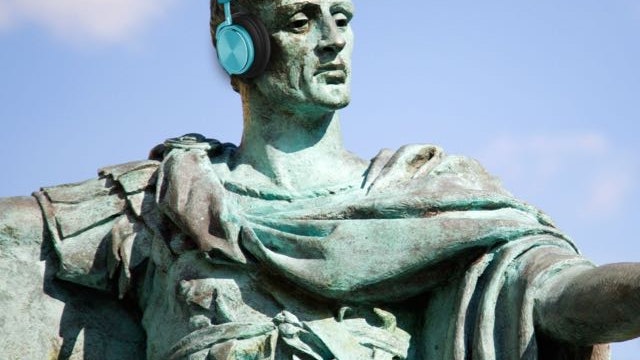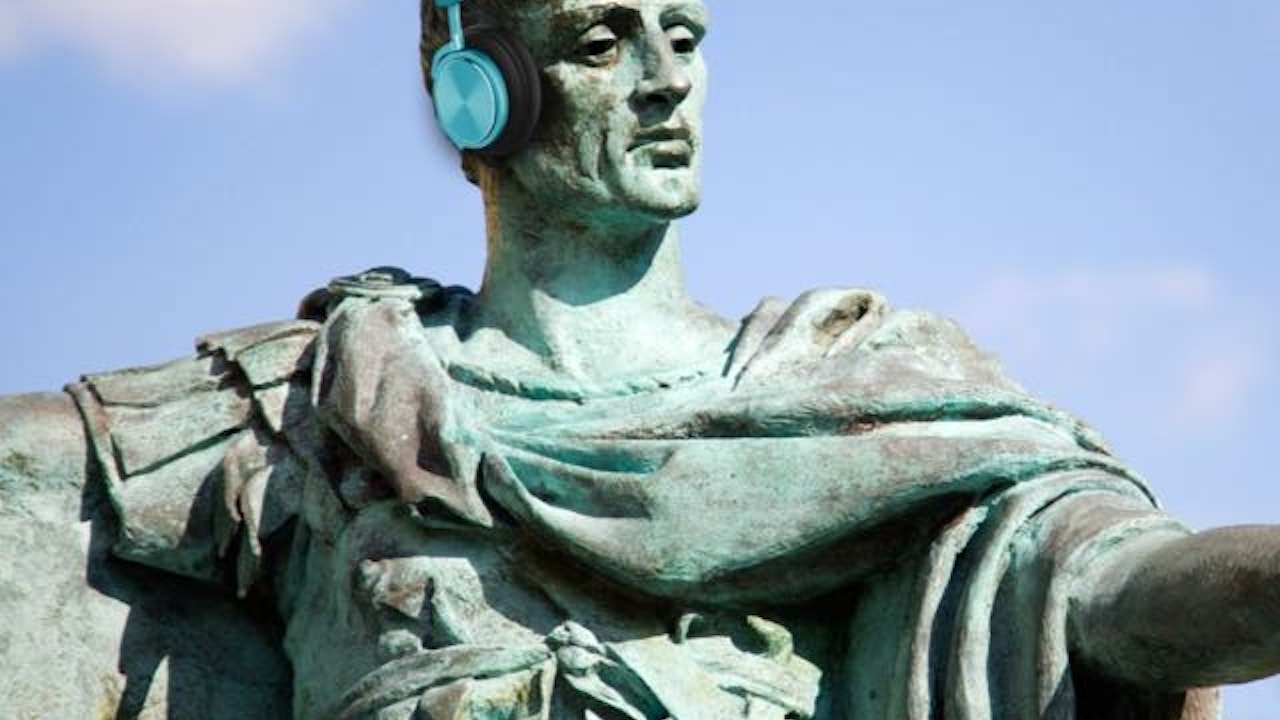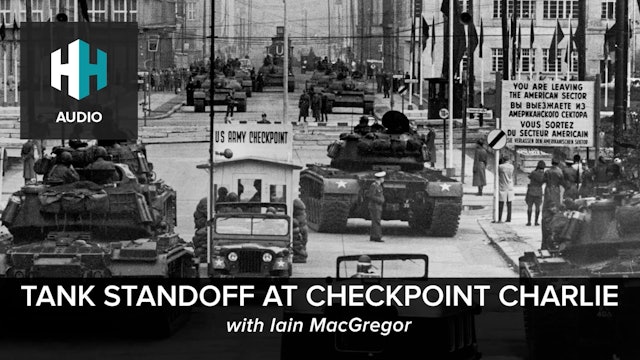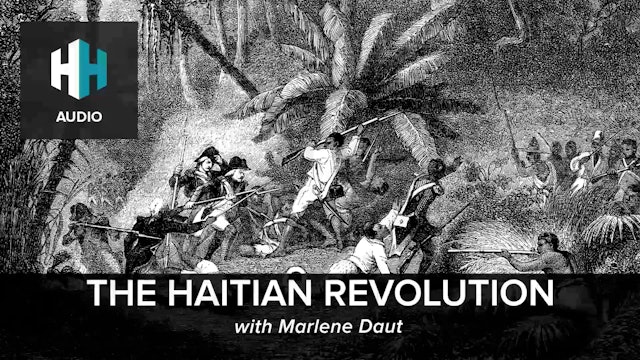Archive of Dan Snow's History Hit 🎧
To get the latest episodes of Dan Snow's History Hit,
If you signed up after October 2023 go to historyhit.com/dashboard
If you signed up before October 2023 go to this form: https://insights.historyhit.com/podcast-rss-feed
-
🎧 Tank Standoff at Checkpoint Charlie
For 16 hours between the 27 to 28 October 1961, the world held its breath as Soviet and US tanks faced each other down at Checkpoint Charlie in Berlin and came very close to turning the Cold War hot. However, one of the most dramatic and dangerous showdowns of the cold war has been largely oversh...
-
🎧 Richard III vs Henry VII
We all think we know the story of Richard III and Henry VII, or do we? Richard III is often portrayed as a child-murdering usurper whose reign was brought to a bloody end by Henry VII at the Battle of Bosworth. It was a grudge match to decide who would become King of England, but how true is this...
-
🎧 Mavia: The Queen Who Defended Arabia
To fight against the Roman empire and then make an alliance with them took a certain courage and tenacity. In this episode we are introduced to Mavia, the warrior queen of the semi-nomadic Tanukhids, who did just that. Dr. Emran El-Badawi, associate professor of Middle Eastern Studies at the Univ...
-
🎧 Meals, Money & The Middle Ages: Eels
The European Eel is now categorised as a critically endangered species, but 1000 years ago they flourished in abundance, and were an important aspect of Medieval life. In this episode, Cat is joined by Medieval historian Dr. John Wyatt Greenlee, also known to many as the ‘Surprise Eel Historian’....
-
🎧 Tuskegee Airmen: A WW2 Pilot's Story
The Tuskegee Airmen were the first African-American military aviators in American military history. They faced discrimination and segregation at home but in the skies of Europe, they became one of the most successful and feared fighter units as they escorted bombers on raids in Czechoslovakia, Au...
-
🎧 Doomsday, Doodles & Mummified Rats: Inside the National Archives
The National Archives can be seen as any medieval historian's candy store. It's filled with an amazing variety of materials, from the Magna Carta to mummified rats. In this episode of Gone Medieval, Matt is joined by Principal Records Specialist at The National Archives (TNA), Dr. Euan Roger. Eua...
-
🎧 Sharpe is Back! Bernard Cornwell
Watch out loyal servants of Napoleon, Sharpe is back! In this episode, Dan sits down with legendary author Bernard Cornwell to discuss the return of his most famous and loved character. Dan asks Bernard all the big questions and discovers how Sharpe originated from adversity, where his love of th...
-
🎧 Britain's Overlooked Hero: From the Trenches to the Blitz
Serving on the front lines of the First World War, the homefront of the Second World War and as a community leader throughout his life, George Arthur Roberts was a truly inspirational figure. Yet, his amazing story is little known. After the outbreak of the First World War broke out he travelled ...
-
🎧 Ancient Kazakhstan: Gold of the Great Steppe
Gold and horses! 2,500 years ago, in the area of the Great Steppe that is now Eastern Kazakhstan, an extraordinary ancient Scythian culture reigned supreme. They were called the Saka, renowned for their skill as horse archers and for their elaborate elite burials.
Ancient Persian and Greek sourc...
-
🎧 The Battle of Trafalgar
On 21 October 1805, A British fleet commanded by Vice-Admiral Horatio Nelson met the combined might of the French and Spanish fleets off the coast of Spain. Outnumbered, Nelson used innovative tactics to break up the allied fleet and ensure success but at great cost to his men and of course himse...
-
🎧 How Brutish Were Our Ancestors?
Was life for our ancient ancestors brutish and short or did they exist as noble savages free and living in harmony with nature and each other? Many of our assumptions about ancient societies stem from Renaissance theories about how society should be organized and what civilisation is. Dan is join...
-
🎧 Vikings & Mice: The Reach of Norse Explorations?
The Azores, an autonomous region of Portugal in the middle of the Atlantic, was said to be discovered in 1427 by Portuguese explorer Diogo de Silves. However, new studies of the land suggest the Portuguese may not have been the island's first inhabitants. The key to these studies? Mice. Similarit...
-
🎧 How Alcohol Built the British Empire
During the eighteenth and nineteenth centuries as the British Empire expanded across the globe an almost ubiquitous but often underappreciated commodity went with it; alcohol. The distillation, sale and drinking of booze played an essential role in trade, seafaring and colonial societies. But for...
-
🎧 Caracalla: The Common Enemy of Mankind?
Often up there in the upper echelons of most articles listing Rome's worst emperors, it's fair to say that history has not been kind to Caracalla. Whether it was contemporary sources depicting him as a deranged Heracles and Alexander the Great loving megalomaniac or the 18th century historian Edw...
-
🎧 Operation Barbarossa: The Lost Diaries
Operation Barbarossa saw a clash of arms between Nazi Germany and the Soviet Union of unprecedented scale and savagery, but what was it really like to serve on the front line of the Eastern Front? The historian Rob Schäfer has given History Hit exclusive access to the diaries of Lt. Friedrich San...
-
🎧 The Haitian Revolution
In 1791 the slaves of the French colony of Sant-Domingue rose up against their colonial masters and after a long and bloody struggle, defeated them to found the state of Haiti. Led by charismatic leaders such as Toussaint Louverture it was the only example of a successful slave revolution and the...
-
🎧 Ai-Khanoum: A Greek City in Afghanistan?
A theatre, a gymnasium and houses with colonnaded courtyards: these are the hallmarks of an Ancient Greek city. So what are they doing in the city of Ai-Khanoum, far east of their origins in present day Afghanistan? In this first part of Tristan’s chat with Milinda Hoo, she takes us through the s...
-
🎧 The Battle of Hastings
On 14 October 1066 the armies of William, the Duke of Normandy, and the Anglo-Saxon King Harold Godwinson clashed near Hastings in one of the most famous battles in history and one that would decide the fate of the English throne. We all know the outcome but how and why did the battle take place?...
-
🎧 Maurice Hilleman: Vaccine Creator
Dr Maurice Hilleman was a leading American microbiologist who specialised in vaccinology and immunology. He discovered nine vaccines that are routinely recommended for children today, rendering formerly devastating diseases practically forgotten. Considered by many to be the father of modern vacc...
-
🎧 Galloway Hoard
In September 2014, a metal detectorist discovered the rarest collection of Viking-age objects ever found to date in Britain. The Galloway hoard displays a remarkable variety of material and treasures, not only from the United Kingdom but as far as central Asia. In this episode, Dr. Martin Goldber...
-
🎧 Alexander the Great's Greatest Victory
In October 331 BC, one of the most important battles of ancient Mediterranean and near eastern history occurred on the plain of Gaugamela. Alexander III of Macedon, better known as Alexander the Great, had been campaigning east of the Aegean Sea against the Persian Empire for 3 ½ years. Already h...
-
🎧 Jack the Ripper Retold
In 1888 a series of brutal killings took place in Whitechapel, London which might be the most famous unsolved murders of all time. The case and the killer attracted a worldwide media frenzy like never before and the perpetrator nicknamed Jack the Ripper has gone down in infamy. But an obsession t...
-
🎧 Gangsters, Pimps & Prostitutes: London's West End
London's West End attracts people from across the world to its many theatres, restaurants and famous nightlife but how did this centre of pleasure come to be? Originally on the fringe of London from its very inception, it was the playground of the rich seeking to let their hair down. Many of thes...
-
🎧 Britain and the Slave Trade
Between the sixteenth and nineteenth centuries, Britain was a key player in the transportation of millions of enslaved Africans to the colonies. Their labour in often brutal conditions was a vital component in enriching Britain and turning it into a global superpower. The business of slavery did ...


























